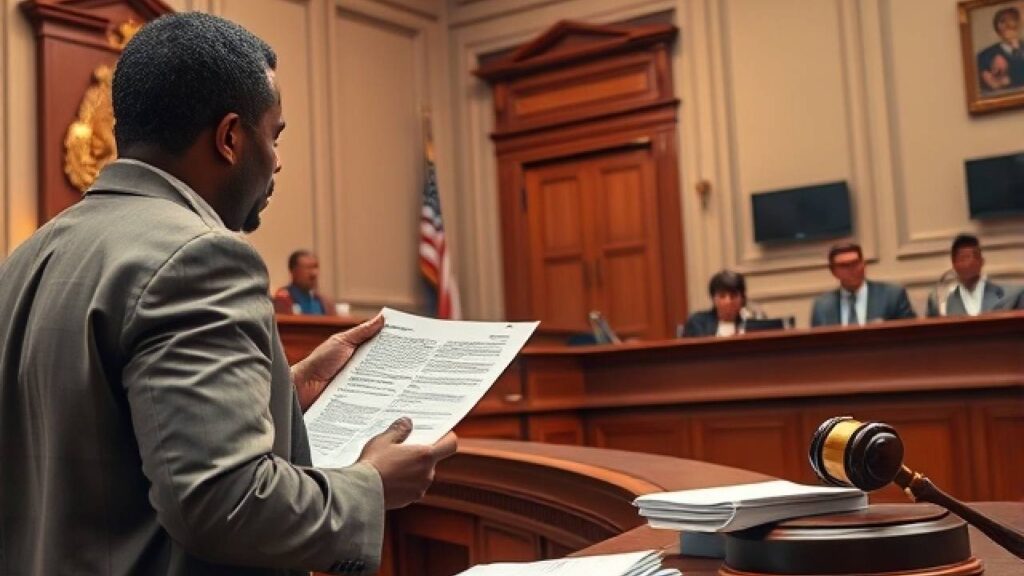In the wake of economic turmoil, thousands in Georgia face the grim reality of eviction, an issue that catapults families into uncertainty. The concept of Eviction Hardship Extension Georgia surfaces as a critical lifeline, providing those at risk with a vital buffer. This extension period allows residents to seek financial stability or alternative housing solutions.
The landscape of eviction laws in Georgia is complex, characterized by a blend of local and state regulations aimed to balance landlord rights and tenant protections. Historically, these laws have adapted to reflect economic shifts and housing crises, integrating provisions such as the eviction hardship extension to address the needs of tenants facing unforeseen financial challenges. Strikingly, recent data highlight that up to 30% of eviction notices in some Georgia counties lead to hardship extensions, underscoring their significance in the community’s fabric.
In Georgia, an eviction hardship extension grants tenants facing financial difficulties a temporary reprieve from eviction. This legal measure allows affected individuals additional time to stabilize their financial situation or find alternative housing, thus preventing immediate displacement and potential homelessness.
Overview of Eviction Hardship Extension Georgia
In Georgia, an eviction hardship extension is a crucial tool for tenants facing unexpected financial difficulties. This legal provision allows residents more time to arrange their finances before having to vacate their properties. It serves as a buffer, helping to prevent immediate homelessness due to sudden economic issues.
The need for such extensions has grown, especially with economic fluctuations impacting many Georgians. Renters can apply for this extension through the court, providing documented evidence of their financial hardship. This process offers them a chance to stabilize their situation without the looming threat of eviction.
Eviction laws in Georgia aim to balance the interests of landlords and tenants. While landlords have the right to recover their properties, the state also recognizes the challenges that can force reliable tenants into arrears. Hence, hardship extensions are a way to ensure fairness in these tough situations.
Overall, the Eviction Hardship Extension Georgia reflects a commitment to supporting community members during tough times. It acknowledges that sometimes, people just need a little more time to get back on their feet. For many, this bit of extra time can make a big difference.
Role and Importance of Eviction Hardship Extension in Georgia
The role of eviction Eviction Hardship Extension Georgia is to ensure that tenants facing temporary financial difficulties do not lose their homes abruptly. This safeguard is crucial, particularly in stabilizing families and individuals during unexpected financial downturns. By postponing the eviction, tenants get valuable time to improve their circumstances, potentially finding new jobs or alternative housing arrangements.
One major importance of these extensions is their contribution to community stability. Sudden evictions can disrupt not just families but entire communities. Schools may see drops in attendance, local businesses lose customers, and neighborhoods experience increased instability. Eviction Hardship Extension Georgia help mitigate these effects by allowing residents to maintain their routines and contributions to the community.
Additionally, the extensions play a significant role in the overall health and wellbeing of the affected individuals. The stress of impending eviction can lead to health problems, both mental and physical. By providing a buffer period, the hardship extensions help alleviate this stress, providing tenants with the peace of mind needed to focus on finding solutions to their financial crises.
Ultimately, these extensions act as a critical support mechanism within Georgia’s legal system, reflecting a societal commitment to protect those in vulnerable positions. They are not only a tool for individual protection but also a strategy for community resilience, ensuring that temporary setbacks do not lead to permanent disadvantages.
Legal Framework Governing Eviction Hardship Extensions in Georgia
In Georgia, the legal framework surrounding eviction hardship extensions is grounded in state legislation that recognizes the need for tenant protection under certain conditions. This framework is designed to provide a structured approach for tenants to request an extension due to financial hardship. Judges often have discretion in these cases, assessing each situation based on its unique circumstances and the evidence presented.
The specifics of requesting an eviction hardship extension involve submitting a formal plea to the court. This must include compelling documentation of the financial distress being experienced, such as recent job loss, medical bills, or other unforeseen financial setbacks. The court then reviews the plea, considering factors like the tenant’s payment history and the landlord’s financial situation.
Under Georgia law, these extensions are not automatic. Tenants must prove not only their financial hardship but also their ongoing effort to rectify their financial situation. This might include showing attempts to secure employment, negotiate payment plans with other debtors, or other efforts to manage their finances responsibly.
Moreover, the state laws aim to balance the tenant’s welfare with the landlord’s rights. Landlords are required to provide adequate notice before eviction proceedings can commence, and they must adhere to formally documented legal processes to evict a tenant. These rules ensure that the process is fair and equitable, preventing any sudden homelessness due to abrupt eviction actions.
Process to Request an Eviction Hardship Extension in Georgia
The process to request an Eviction Hardship Extension Georgia begins with understanding your rights as a tenant. Before taking any action, it’s important to know that this option exists and under what circumstances it can be utilized. This knowledge gives tenants the confidence to navigate the legal process effectively.
Firstly, the tenant must gather proof of their financial hardship. This evidence should clearly demonstrate why it’s challenging to meet rental obligations. Common documents include recent job loss notifications, medical bills, or proof of sudden financial obligations like emergency repairs.
- Write a formal hardship letter explaining your situation.
- Collect all relevant financial documents.
- Contact your landlord to attempt a negotiation.
Next, the tenant should submit an application for a hardship extension to the court. This application must include the hardship letter, financial documents, and any communication with the landlord. The tenant should also be prepared to present their case in court, explaining the steps they’ve taken to mitigate their financial issues.
After the tenant submits their request, the court will review the documents and set a hearing date. At the hearing, both the tenant and landlord can present their sides of the story. The judge will then make a decision based on the evidence and arguments presented.
If the Eviction Hardship Extension Georgia is granted, it will provide the tenant with additional time to either catch up on rent or find new accommodation, thus avoiding immediate eviction. It’s crucial for tenants to utilize this time effectively to stabilize their financial situation as much as possible.
Effects on Tenants and Landlords
Eviction Hardship Extension Georgia have significant effects on both tenants and landlords. For tenants, the primary benefit is the prevention of immediate homelessness. This extra time allows them to either gather enough funds to pay back rent or find new housing, reducing the risk of them entering the homeless population.
For landlords, while these extensions can delay the retrieval of owed rent, they also offer a period to negotiate payment plans or find long-term solutions with tenants. This can lead to better tenant-landlord relationships and potentially more stable rental income in the future if conflicts are resolved amicably.
However, if a hardship extension is granted frequently or leniently without stringent checks, it might encourage some tenants to take undue advantage, leading to financial strain on landlords. This situation can exacerbate tensions and foster an environment of mistrust and financial instability within the rental market.
- Prevents immediate tenant homelessness.
- Provides recovery time for financial stability.
- Encourages negotiation and potential long-term tenant retention for landlords.
- May lead to misuse and financial strain on landlords.
Overall, while eviction hardship extensions serve as a vital safety net for tenants, they require careful regulation and balance to ensure they fulfill their role without leading to undue burden on landlords. This dual impact underscores the importance of a well-rounded legal approach to eviction laws and tenant protections in Georgia.
Future of Eviction Hardship Extensions in Georgia
Looking ahead, the future of eviction hardship extensions in Georgia seems to be leaning towards more structured and defined processes. As awareness grows about the importance of these extensions, legislators and advocacy groups are working to refine the guidelines that determine eligibility and ensure they are fairly implemented.
Tech advancements could also play a significant role in the future of these extensions. With digital platforms potentially streamlining the application process, tenants may find it easier to submit requests promptly. This would also help the court systems manage and review cases more efficiently, ensuring timely decisions.
There is also a growing conversation about expanding the criteria for eviction hardship extensions to include more diverse circumstances. As economic conditions evolve, adapting these regulations to include factors like global pandemics or regional economic downturns could become necessary to maintain housing stability.
- Refining eligibility guidelines.
- Incorporating technology for efficiency.
- Expanding criteria to adapt to new economic challenges.
Overall, the future of eviction hardship extensions in Georgia is focused on improving fairness and accessibility. By adapting laws and processes to better meet the needs of both tenants and landlords, Georgia aims to foster a more stable and supportive housing market.
Reflecting on Eviction Hardship Extensions in Georgia
Eviction Hardship Extension Georgia not only provide a critical lifeline for tenants during financial upheavals but also reflect a balanced approach towards tenant-landlord relationships. These legal provisions are fundamental in maintaining housing stability and community integrity during economic fluctuations.
As we look towards the future, continuous evaluation and adaptation of these extensions will be crucial. Ensuring they meet the evolving economic challenges will help sustain the overarching goal of fairness and dignity in housing practices throughout Georgia.
FAQ:
What is the Eviction Hardship Extension in Georgia?
The Eviction Hardship Extension in Georgia is a temporary reprieve from eviction for tenants facing financial hardship, which allows them time, to stabilize their finances or find alternative housing.
What is the future of Eviction Hardship Extensions in Georgia?
The future of Eviction Hardship Extension Georgia, seems to be leaning towards more structured and defined processes, with potential refinements in eligibility guidelines, incorporation of technology and expansions in criteria to new economic challenges.
Where does the Eviction Hardship Extension Georgia makes impact?
Eviction Hardship Extension Georgia have significant effects on both tenants and landlords.







